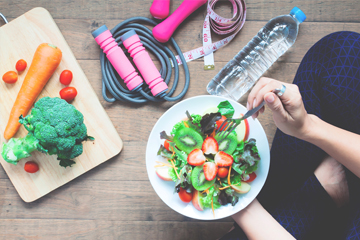Have you gained the “Quarantine 15”? Don’t worry – there are many ways to get back on track with your diet.

The “Quarantine 15” refers to weight that many people have experienced since stay-at-home guidelines went into effect. This weight gain is likely due to the interruption in daily routine and habits. The Washington Post reported on a study by Withings, the maker of popular Internet-connected scales and other body-measurement devices, that evaluated body weight trends of about 450,000 American users between March 22 and April 18 – when New York ordered people to stay home. The study found that despite concerns about gaining a “quarantine 15,” the average user gained 0.21 pounds during that month, with about 37 percent gaining more than a pound.
Weight gain is more likely to happen from the stress and self-isolation brought upon by the novel coronavirus. Boredom or stress or both have a powerful effect on appetite that cause people to eat even when they’re not hungry as well as to overeat. Spending more time in the house to avoid catching or spreading COVID-19 has fueled comfort-eating. Moreover, as there’s no prescribed lunch break – like in an office – or a breakfast to be grabbed before the commute, you might skip meals in between or will tend to snack
This eating habits can be harmful for the body. “People’s habits have changed quite a bit since we’re spending more time at home, and those changes can lead to health and medical issues down the road,” says Dr Donald Hensrud, medical director of the Healthy Living Programme at the Mayo Clinic.
Both snacking and skipping meals can be a factor of your weight gain. According to a study, skipping breakfast can disturb the body’s internal clock and cause weight gain, even if one does not overeat for the rest of the day. The good news is that you can reverse the trend and regain control. Here are six tips that you can adopt to avoid the Quarantine 15:
- Eat nutritious foods: Eat nutritious food from all food groups every day such as wholegrain bread and cereals, vegetables, fruit, milk and dairy, and meat, fish or legumes. A well-nourished body has a stronger stress-resistant shield. Choose low-fat varieties that can fortify the body. Foods containing omega-3 fatty acids such as seafood, nuts, seeds, and oils such as canola, flax, and soybean can protect against heart disease and relieve mild depression. Also, stay hydrated.
- Portion meals: Eat a decent-sized portion without overdoing calorie consumption. Measure your food – if you don’t, you will end up eating more food than you want, which will lead to unwanted weight gain and obesity.
- Mindful Eating: Practice mindful eating by listening to your hunger cues so that you can respond to them effectively. When the stomach’s full, your brain will receive a signal saying you’re full. Pay attention to those signals and you will be less likely to overeat.
- Avoid unhealthy snacking: It’s okay to have a snack between meals, but avoid unhealthy snacks like candies, French fries, instant noodles, ice-cream and soft drinks. These calorie-rich items not only cause obesity but also affect our appetite and hinder the intake of nutritious food. Switch to healthy snacks like nuts, fruits, or yogurt, which can keep you becoming over-hungry as you approach your next meal.
- Maintain a structured routine: If you’re working from home or are no longer working, it can be difficult to keep track of time. Try to stick to a schedule – this can help you better manage your meals. Instead of grabbing snacks every time you pass the kitchen, schedule eating times for breakfast, lunch and dinner and stick to them.
- Exercise: In addition to good nutrition, exercise is important to prevent weight gain. To compensate for the extra consumption of calories, engage in activities that burn more calories. Stay active on all days of the week. Try simple but effective exercises like walking at the beginning of the day and after dinner.
Importantly, maintain a positive attitude. If you feel you cannot get things on track on your own, you can get help online from a reliable therapist or dietician.